- Home
- Leo Tolstoy
The Kingdom of God Is Within You Page 3
The Kingdom of God Is Within You Read online
Page 3
The work of Garrison, the father, in his foundation of the Society of Non-resistants and his Declaration, even more than my correspondence with the Quakers, convinced me of the fact that the departure of the ruling form of Christianity from the law of Christ on non-resistance by force is an error that has long been observed and pointed out, and that men have labored, and are still laboring, to correct. Ballou's work confirmed me still more in this view. But the fate of Garrison, still more that of Ballou, in being completely unrecognized in spite of fifty years of obstinate and persistent work in the same direction, confirmed me in the idea that there exists a kind of tacit but steadfast conspiracy of silence about all such efforts.
Ballou died in August, 1890, and there was as obituary notice of him in an American journal of Christian views (RELIGIO-PHILOSOPHICAL JOURNAL, August 23). In this laudatory notice it is recorded that Ballou was the spiritual director of a parish, that he delivered from eight to nine thousand sermons, married one thousand couples, and wrote about five hundred articles; but there is not a single word said of the object to which he devoted his life; even the word "non-resistance" is not mentioned. Precisely as it was with all the preaching of the Quakers for two hundred years and, too, with the efforts of Garrison the father, the foundation of his society and journal, and his Declaration, so it is with the life-work of Ballou. It seems just as though it did not exist and never had existed.
We have an astounding example of the obscurity of works which aim at expounding the doctrine of non-resistance to evil by force, and at confuting those who do not recognize this commandment, in the book of the Tsech Helchitsky, which has only lately been noticed and has not hitherto been printed.
Soon after the appearance of my book in German, I received a letter from Prague, from a professor of the university there, informing me of the existence of a work, never yet printed, by Helchitsky, a Tsech of the fifteenth century, entitled "The Net of Faith." In this work, the professor told me, Helchitsky expressed precisely the same view as to true and false Christianity as I had expressed in my book "What I Believe." The professor wrote to me that Helchitsky's work was to be published for the first time in the Tsech language in the JOURNAL OF THE PETERSBURG ACADEMY OF SILENCE. Since I could not obtain the book itself, I tried to make myself acquainted with what was known of Helchitsky, and I gained the following information from a German book sent me by the Prague professor and from Pypin's history of Tsech literature. This was Pypin's account:
"'The Net of Faith' is Christ's teaching, which ought to draw man up out of the dark depths of the sea of worldliness and his own iniquity. True faith consists in believing God's Word; but now a time has come when men mistake the true faith for heresy, and therefore it is for the reason to point out what the true faith consists in, if anyone does not know this. It is hidden in darkness from men, and they do not recognize the true law of Christ.
"To make this law plain, Helchitsky points to the primitive organization of Christian society—the organization which, he says, is now regarded in the Roman Church as an abominable heresy. This Primitive Church was his special ideal of social organization, founded on equality, liberty, and fraternity. Christianity, in Helchitsky's view, still preserves these elements, and it is only necessary for society to return to its pure doctrine to render unnecessary every other form of social order in which kings and popes are essential; the law of love would alone be sufficient in every case.
"Historically, Helchitsky attributes the degeneration of Christianity to the times of Constantine the Great, whom he Pope Sylvester admitted into the Christian Church with all his heathen morals and life. Constantine, in his turn, endowed the Pope with worldly riches and power. From that time forward these two ruling powers were constantly aiding one another to strive for nothing but outward glory. Divines and ecclesiastical dignitaries began to concern themselves only about subduing the whole world to their authority, incited men against one another to murder and plunder, and in creed and life reduced Christianity to a nullity. Helchitsky denies completely the right to make war and to inflict the punishment of death; every soldier, even the 'knight,' is only a violent evil doer—a murderer."
The same account is given by the German book, with the addition of a few biographical details and some extracts from Helchitsky's writings.
Having learnt the drift of Helchitsky's teaching in this way, I awaited all the more impatiently the appearance of "The Net of Faith" in the journal of the Academy. But one year passed, then two and three, and still the book did not appear. It was only in 1888 that I learned that the printing of the book, which had been begun, was stopped. I obtained the proofs of what had been printed and read them through. It is a marvelous book from every point of view.
Its general tenor is given with perfect accuracy by Pypin. Helchitsky's fundamental idea is that Christianity, by allying itself with temporal power in the days of Constantine, and by continuing to develop in such conditions, has become completely distorted, and has ceased to be Christian altogether. Helchitsky gave the title "The Net of Faith" to his book, taking as his motto the verse of the Gospel about the calling of the disciples to be fishers of men; and, developing this metaphor, he says:
"Christ, by means of his disciples, would have caught all the world in his net of faith, but the greater fishes broke the net and escaped out of it, and all the rest have slipped through the holes made by the greater fishes, so that the net has remained quite empty. The greater fishes who broke the net are the rulers, emperors, popes, kings, who have not renounced power, and instead of true Christianity have put on what is simply a mask of it."
Helchitsky teaches precisely what has been and is taught in these days by the non-resistant Mennonites and Quakers, and in former tunes by the Bogomilites, Paulicians, and many others. He teaches that Christianity, expecting from its adherents gentleness, meekness, peaceableness, forgiveness of injuries, turning the other cheek when one is struck, and love for enemies, is inconsistent with the use of force, which is an indispensable condition of authority.
The Christian, according to Helchitsky's reasoning, not only cannot be a ruler or a soldier; he cannot take any part in government nor in trade, or even be a landowner; he can only be an artisan or a husbandman.
This book is one of the few works attacking official Christianity which has escaped being burned. All such so-called heretical works were burned at the stake, together with their authors, so that there are few ancient works exposing the errors of official Christianity. The book has a special interest for this reason alone. But apart from its interest from every point of view, it is one of the most remarkable products of thought for its depth of aim, for the astounding strength and beauty of the national language in which it is written, and for its antiquity. And yet for more than four centuries it has remained unprinted, and is still unknown, except to a few learned specialists.
One would have thought that all such works, whether of the Quakers, of Garrison, of Ballou, or of Helchitsky, asserting and proving as they do, on the principles of the Gospel, that our modern world takes a false view of Christ's teaching, would have awakened interest, excitement, talk, and discussion among spiritual teachers and their flocks alike.
Works of this kind, dealing with the very essence of Christian doctrine, ought, one would have thought, to have been examined and accepted as true, or refuted and rejected. But nothing of the kind has occurred, and the same fate has been repeated with all those works. Men of the most diverse views, believers, and, what is surprising, unbelieving liberals also, as though by agreement, all preserve the same persistent silence about them, and all that has been done by people to explain the true meaning of Christ's doctrine remains either ignored or forgotten.
But it is still more astonishing that two other books, of which I heard on the appearance of my book, should be so little known, I mean Dymond's book "On War," published for the first time in London in 1824, and Daniel Musser's book on "Non-resistance," written in 1864. It is particularly astonishing t
hat these books should be unknown, because, apart from their intrinsic merits, both books treat not so much of the theory as of the practical application of the theory to life, of the attitude of Christianity to military service, which is especially important and interesting now in these clays of universal conscription.
People will ask, perhaps: How ought a subject to behave who believes that war is inconsistent with his religion while the government demands from him that he should enter military service?
This question is, I think, a most vital one, and the answer to it is specially important in these days of universal conscription. All—or at least the great majority of the people—are Christians, and all men are called upon for military service. How ought a man, as a Christian, to meet this demand? This is the gist of Dymond's answer:
"His duty is humbly but steadfastly to refuse to serve."
There are some people, who, without any definite reasoning about it, conclude straightway that the responsibility of government measures rests entirely on those who resolve on them, or that the governments and sovereigns decide the question of what is good or bad for their subjects, and the duty of the subjects is merely to obey. I think that arguments of this kind only obscure men's conscience. I cannot take part in the councils of government, and therefore I am not responsible for its misdeeds.. Indeed, but we are responsible for our own misdeeds. And the misdeeds of our rulers become our own, if we, knowing that they are misdeeds, assist in carrying, them out. Those who suppose that they are bound to obey the government, and that the responsibility for the misdeeds they commit is transferred from them to their rulers, deceive themselves. They say: "We give our acts up to the will of others, and our acts cannot be good or bad; there is no merit in what is good nor responsibility for what is evil in our actions, since they are not done of our own will."
It is remarkable that the very same thing is said in the instructions to soldiers which they make them learn—that is, that the officer is alone responsible for the consequences of his command. But this is not right. A man cannot get rid of the responsibility, for his own actions. And that is clear from the following example. If your officer commands you to kill your neighbor's child, to kill your father or your mother, would you obey? If you would not obey, the whole argument falls to the ground, for if you can disobey the governors in one case, where do you draw the line up to which you can obey them? There is no line other than that laid down by Christianity, and that line is both reasonable and practicable.
And therefore we consider it the duty of every man who thinks war inconsistent with Christianity, meekly but firmly to refuse to serve in the army. And let those whose lot it is to act thus, remember that the fulfillment of a great duty rests with them. The destiny of humanity in the world depends, so far as it depends on men at all, on their fidelity to their religion. Let them confess their conviction, and stand up for it, and not in words alone, but in sufferings too, if need be. If you believe that Christ forbade murder, pay no heed to the arguments nor to the commands of those who call on you to bear a hand in it. By such a steadfast refusal to make use of force, you call down on yourselves the blessing promised to those "who hear these sayings and do them," and the time will come when the world will recognize you as having aided in the reformation of mankind.
Musser's book is called "Non-resistance Asserted," or "Kingdom of Christ and Kingdoms of this World Separated." This book is devoted to the same question, and was written when the American Government was exacting military service from its citizens at the time of the Civil War. And it has, too, a value for all time, dealing with the question how, in such circumstances, people should and can refuse to enter military service. Here is the tenor of the author's introductory remarks:
"It is well known that there are many persons in the United States who refuse to fight on grounds of conscience. They are called the 'defenseless,' or 'non-resistant' Christians. These Christians refuse to defend their country, to bear arms, or at the call of government to make war on its enemies. Till lately this religious scruple seemed a valid excuse to the government, and those who urged it were let off service. But at the beginning of our Civil War public opinion was agitated on this subject. It was natural that persons who considered it their duty to bear all the hardships and dangers of war in defense of their country should feel resentment against those persons who had for long shared with them the advantages of the protection of government, and who now in time of need and danger would not share in bearing the labors and dangers of its defense. It was even natural that they should declare the attitude of such men monstrous, irrational, and suspicious."
A host of orators and writers, our author tells us, arose to oppose this attitude, and tried to prove the sinfulness of non-resistance, both from Scripture and on common-sense grounds. And this was perfectly natural, and in many cases the authors were right—right, that is, in regard to persons who did not renounce the benefits they received from the government and tried to avoid the hardships of military service, but not right in regard to the principle of non-resistance itself. Above all, our author proves the binding nature of the rule of non-resistance for a Christian, pointing out that this command is perfectly clear, and is enjoined upon every Christian by Christ without possibility of misinterpretation. "Bethink yourselves whether it is righteous to obey man more than God," said Peter and John. And this is precisely what ought to be the attitude to every man who wishes to be Christian to the claim on him for military service, when Christ has said, "Resist not evil by force." As for the question of the principle itself, the author regards that as decided. As to the second question, whether people have the right to refuse to serve in the army who have not refused the benefits conferred by a government resting on force, the author considers it in detail, and arrives at the conclusion that a Christian following the law of Christ, since he does not go to war, ought not either to take advantage of any institutions of government, courts of law, or elections, and that in his private concerns he must not have recourse to the authorities, the police, or the law. Further on in the book he treats of the relation of the Old Testament to the New, the value of government for those who are Christians, and makes some observations on the doctrine of non-resistance and the attacks made on it. The author concludes his book by saying: "Christians do not need government, and therefore they cannot either obey it in what is contrary to Christ's teaching nor, still less, take part in it." Christ took his disciples out of the world, he says. They do not expect worldly blessings and worldly happiness, but they expect eternal life. The Spirit in whom they live makes them contented and happy in every position. If the world tolerates them, they are always happy. If the world will not leave them in peace, they will go elsewhere, since they are pilgrims on the earth and they have no fixed place of habitation. They believe that "the dead may bury their dead." One thing only is needful for them, "to follow their Master."
Even putting aside the question as to the principle laid down in these two books as to the Christian's duty in his attitude to war, one cannot help perceiving the practical importance and the urgent need of deciding the question.
There are people, hundreds of thousands of Quakers, Mennonites, all our Douhobortsi, Molokani, and others who do not belong to any definite sect, who consider that the use of force—and, consequently, military service—is inconsistent with Christianity. Consequently there are every year among us in Russia some men called upon for military service who refuse to serve on the ground of their religious convictions. Does the government let them off then? No. Does it compel them to go, and in case of disobedience punish them? No. This was how the government treated them in 1818. Here is an extract from the diary of Nicholas Myravyov of Kars, which was not passed by the censor, and is not known in Russia:
"Tiflis, October 2, 1818.
"In the morning the commandant told me that five peasants belonging to a landowner in the Tamboff government had lately been sent to Georgia. These men had been sent for soldiers, but they would not serve; the
y had been several times flogged and made to run the gauntlet, but they would submit readily to the cruelest tortures, and even to death, rather than serve. 'Let us go,' they said, 'and leave us alone; we will not hurt anyone; all men are equal, and the Tzar is a man like us; why should we pay him tribute; why should I expose my life to danger to kill in battle some man who has done me no harm? You can cut us to pieces and we will not be soldiers. He who has compassion on us will give us charity, but as for the government rations, we have not had them and we do not want to have them.' These were the words of those peasants, who declare that there are numbers like them Russia. They brought them four times before the Committee of Ministers, and at last decided to lay the matter before the Tzar who gave orders that they should be taken to Georgia for correction, and commanded the commander-in-chief to send him a report every month of their gradual success in bringing these peasants to a better mind."
How the correction ended is not known, as the whole episode indeed was unknown, having been kept in profound secrecy.
This was how the government behaved seventy-five years ago—this is how it has behaved in a great cumber of cases, studiously concealed from the people. And this is how the government behaves now, except in the case of the German Mennonites, living in the province of Kherson, whose plea against military service is considered well grounded. They are made to work off their term of service in labor in the forests.
But in the recent cases of refusal on the part of Mennonites to serve in the army on religious grounds, the government authorities have acted in the following manner:

 The Death of Ivan Ilych
The Death of Ivan Ilych Anna Karenina
Anna Karenina Resurrection
Resurrection Family Happiness
Family Happiness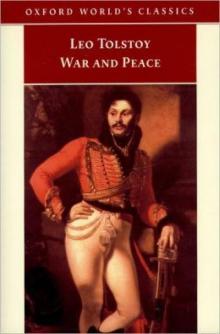 War and Peace
War and Peace The Cossacks
The Cossacks The Kreutzer Sonata
The Kreutzer Sonata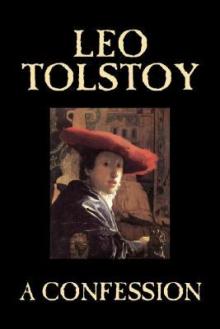 A Confession
A Confession The Kingdom of God Is Within You
The Kingdom of God Is Within You Father Sergius
Father Sergius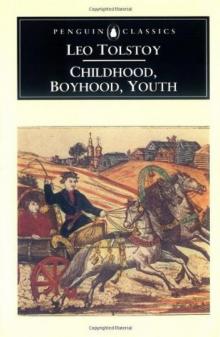 Childhood, Boyhood, Youth
Childhood, Boyhood, Youth Lives and Deaths
Lives and Deaths The Devil
The Devil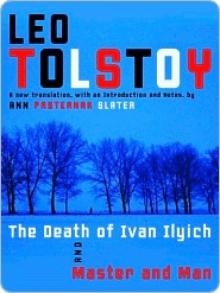 The Death of Ivan Ilyich and Master and Man
The Death of Ivan Ilyich and Master and Man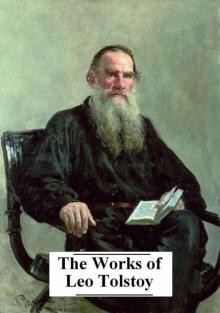 The Complete Works of Leo Tolstoy (25+ Works with active table of contents)
The Complete Works of Leo Tolstoy (25+ Works with active table of contents)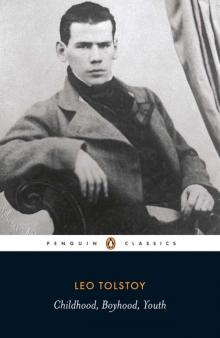 Childhood, Boyhood, Youth (Penguin ed.)
Childhood, Boyhood, Youth (Penguin ed.)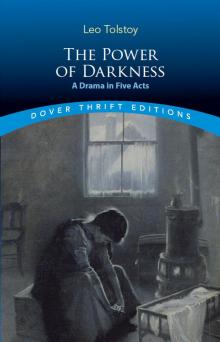 The Power of Darkness
The Power of Darkness Android Karenina
Android Karenina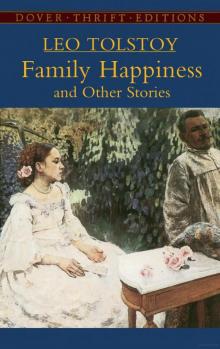 Family Happiness and Other Stories
Family Happiness and Other Stories The Lion and the Puppy
The Lion and the Puppy Collected Shorter Fiction, Volume 2
Collected Shorter Fiction, Volume 2 Collected Shorter Fiction, Volume 1
Collected Shorter Fiction, Volume 1